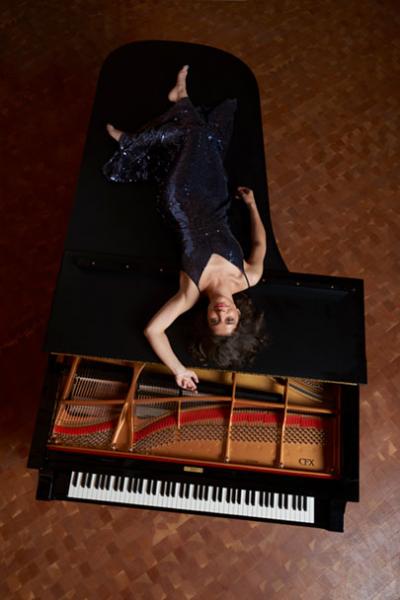Out of Odessa: A Pianist’s Tale

Since her debuts as a teenager at the Gilmore Keyboard Festival and with the Chicago Symphony Orchestra, Inna Faliks has performed thousands of recitals and concerts at venues throughout the United States, Asia, and Europe, among them Carnegie Hall’s Weill Concert Hall, the Metropolitan Museum of Art, the Salle Cortot in Paris, and Tchaikovsky Hall in Moscow. She is currently professor of piano and head of piano at U.C.L.A.’s Herb Alpert School of Music.
As her performance of “Polonaise-fantaisie: The Story of a Pianist” tomorrow evening at 6 at the Parrish Art Museum in Water Mill will demonstrate, her talent extends far beyond the keyboard. Released as a Delos CD last year and performed live since then at various venues, the program consists of a recital of piano works by classical and contemporary composers interspersed with stories of her life as a child in Odessa, her family’s emigration from Ukraine to the United States, her formative influences, and her evolution as an artist.
“I’ve always loved writing, and growing up I was surrounded by books and poetry,” she said during a recent telephone conversation from Los Angeles, where she lives with her husband, Misha Shpigelmacher, and their children, Nathaniel and Frida. In 2008, long before developing “Polonaise-fantaisie,” she founded Music/Word, a series of concerts that bring poets and musicians together. Music/Word programs have been seen and heard nationwide.
“I consider my childhood in Odessa to be very important to who I am as an artist. I just felt I needed to write it down.” When she was 10, her family left Odessa as Jewish refugees to escape
anti-Semitism “and to give me a chance to have a career as an artist. Basically, at that time it was much more difficult for Jews to have the same level of opportunity as other people throughout the Soviet Union.”
She continued her immersive study of music when the family settled in Chicago, but assimilation was difficult at first. “When I came here it was a big culture shock, and it was difficult to be accepted.” As she began to make her mark as a performer here and her accent disappeared, the difficulties of assimilation receded. She has dedicated the piece to her parents, her husband and children, and to “anyone who has ever left a place in search of a better life.”
The program will begin with a modern composition, “Basso Ostinato,” the best-known work by the Russian composer Rodion Shchedrin for solo piano. That piece will be followed by Bach’s Prelude and Fugue in G sharp minor; “Ballade in Black and White,” which was composed for Ms. Faliks in 2006 by Jan Freidlin, another Russian; Mozart’s Fantasy in D minor, and short pieces by Chopin and Liszt. Beethoven’s complete Bagatelles (Op. 126) will follow a brief intermission.
Ms. Faliks has performed many times in Russia. “The audience members there are unbelievable, passionate about music, grateful, and exquisite in how they receive artists. I’ve never been back to Odessa, but it is my dream to go back.”
Tickets are $25, $10 for members. The Golden Pear Cafe and the museum will be open before and after the concert.
